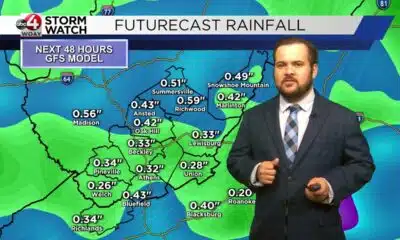News from the South - North Carolina News Feed
Congressman Edwards says Moffitt bill to eliminate ‘50 percent’ rule ‘might not be completely thought out’ • Asheville Watchdog
Western North Carolina’s congressional representative and a state senator pushing a bold Helene-related recovery plan are at loggerheads over the bill’s potential effects, with both issuing barbed statements about the other’s take on the proposal.
U.S. Rep. Chuck Edwards says a state bill sponsored by Republican state Sen. Tim Moffitt that would eliminate a provision requiring owners of flooded properties to rebuild to modern standards if the damage exceeds 50 percent, would circumvent federal flood policy and place North Carolina property owners out of compliance with the program.
“I think we’ll find that Senate Bill 266 might not be completely thought out,” Edwards, R-N.C., said in an emailed statement to Asheville Watchdog. “Since Helene hit, I’ve been engaged on the matter of reviewing the National Flood Insurance Program for the sole purpose of western North Carolina’s recovery. What I’ve discovered is circumventing federal flood policy that exists to protect the most vulnerably located structures in the 100-year floodplain from further damage is not the right approach.”

As The Watchdog reported May 7, Moffitt is shepherding the bill through the North Carolina state legislature, with the measure unanimously passing the state Senate that day and now headed to the state House. The House on May 8 passed the bill on first reading and referred it to the Committee on Rules, Calendar, and Operations.
The bill includes a plan that would waive for two years the state building code’s “50 percent rule,” which requires any building with flood damage costing more than half its value to be rebuilt to newer, stricter building codes. Moffitt says the measure would clear up uncertainty surrounding flooded properties and spur rebuilding in the region, which was hard hit by Tropical Storm Helene.
Moffitt said previously that once the bill passes the state house, he will have to work with the federal government, as its provisions will require approval through the National Flood Insurance Program. Moffitt, who represents Henderson, Polk and Rutherford counties in the state Senate, says Edwards is mistaken in his take on the bill.
“With all due respect to Congressman Edwards, it appears there has been a misunderstanding regarding Senate Bill 266,” Moffitt said via email. “These are complex issues, and it’s an easy mistake to make.”
Moffitt said one of the most significant obstacles to rebuilding in flood-damaged areas is the requirement to meet the new base flood elevation standards.
“This requirement is triggered when damage to a structure exceeds 50 percent of its pre-storm market value,” Moffitt said. “In many communities, entire neighborhoods were lost. In others, most properties surpassed that 50 percent damage threshold. As a result, this mandate now affects not just hundreds or thousands of structures and families, but potentially many more in terms of lost jobs and stalled economic recovery.”
Moffitt said policymakers have to be cautious “not to overcorrect in response to rare, catastrophic events.”

“Reactionary policies can inadvertently hinder recovery efforts,” Moffitt said. “It is equally our duty to identify and address obstacles standing in the way of that recovery.”
Edwards, who served in the state Senate from 2016 to 2023, said the bill would place the entire state “out of compliance with NFIP’s minimum floodplain management standards and jeopardizes its NFIP eligibility.
“From the mountains to the coast, all 595 participating North Carolina communities would be at risk of losing access to flood insurance coverage across more than 132,000 policies totaling $4.3 billion in coverage,” Edwards said. “Even worse, the bill would make it harder for North Carolina to recover from future flood disasters by making homeowners in the 100-year floodplain ineligible for disaster recovery aid, including FEMA Individual Assistance, which has been so heavily relied on by the folks of NC-11.”
The 11th Congressional District covers 17 mountain counties, including Buncombe.
A chilling effect on real estate?
Edwards said that perhaps the “most chilling” effect of Moffitt’s bill would be on real estate.
“Real estate transactions, such as closings and refinancings, with mandatory purchase requirements would be halted, and federal mortgage insurance or loan guarantees, including VA loans, would no longer be available to properties in the 100-year floodplain,” Edwards said. “Furthermore, the already-strained housing market would be frozen in the floodplain.”
Moffitt maintains that SB 266, which proposes a “Historic Flood Exemption,” would “challenge overreach” from the Stafford Act, which provides the framework for federal disaster relief. Also, the bill will “highlight the limitations of the National Flood Insurance Program.”
“The bill calls for a Congressional re-evaluation of these federal frameworks,” Moffitt said. “It acknowledges that no building codes — past or present — could have anticipated or prevented the devastation caused by a 1,000-year flood event. Some structures, despite being built to modern code within the 100-year floodplain, were still completely destroyed. Yet we continue to impose those same standards on others. Why?”
Moffitt acknowledges the state bill can’t take full effect without federal action, but he also said “its passage at the state level signals the need for change and sets the stage for federal involvement.”
In his statement, Edwards said the mountains are full of “resilient, strong people” and that he understands and supports “the urgency that folks feel to get back to normal.” But Edwards continued, “it cannot be at the expense of the long-term access to federal benefits and resilience of our entire state.
“I also understand that building to new code standards can be expensive, but that is exactly what the $110 billion disaster aid package I drafted and passed in December is meant to address,” Edwards said.
He also noted that North Carolina and the City of Asheville are slated to receive a total of $1.625 billion in Community Development Block Grant-Disaster Recovery funding to help the region recover, “including for this exact reason — to help homeowners fund resilience and retrofit projects that conform with new codes.”

Moffitt said frequent use of terms like mitigation and resiliency may be well-intentioned, but they raise concerns.
“These efforts, if not carefully balanced, risk stripping rights from those already victimized by the storm, and may further harm them through inflexible regulation,” Moffitt said. “History has shown us, notably with Hurricane Katrina, that sweeping, one-size-fits-all policy changes don’t always yield the desired results and can create unintended consequences.”
Moffitt also noted that over the past few months he’s worked with members of the U.S. House and Senate, as well as the White House, on Helene response.
“I remain optimistic that we can build the momentum necessary to bring about the federal reforms that will make SB266 a reality,” Moffitt said. “After all, the barriers we face are not immutable laws of nature — they are man-made policies. And what lawmakers have created, lawmakers can also change.”
Western Carolina University political scientist Chris Cooper said that despite the bill’s easy passage in the Senate, that doesn’t mean it will sail through the House.
”Heavy lift’ is an apt phrase’
“There’s an old adage that says, ‘The other party is your opposition; the other chamber is your enemy,’” Cooper said. “And we see a lot of bills that get through one chamber and don’t ever see the light of day in the other.”
If it does get through both chambers, the measure will need that key federal approval, and Cooper doubts that will be easy to come by.
“As we can see from Edwards’ (response), the prospects are not particularly likely,” Cooper said, noting that Moffitt acknowledged the entire process would be a heavy lift. “‘Heavy lift’ is an apt phrase. It is unlikely to be successful.”
Cooper also noted that the bill has already created odd political bedfellows, as all Senate members voted in favor, including Democrats such as Julie Mayfield, D-Buncombe, and Sen. Phil Berger Sr., president pro tempore of the Senate and a longtime state Republican power broker.
“For Chuck Edwards to be on a different side than Phil Berger Sr. is unheard of,” Cooper said. “‘Strange bedfellows’ doesn’t begin to describe what’s happening here.”
Asheville Watchdog welcomes thoughtful reader comments on this story, which has been republished on our Facebook page. Please submit your comments there.
Asheville Watchdog is a nonprofit news team producing stories that matter to Asheville and Buncombe County. John Boyle has been covering Asheville and surrounding communities since the 20th century. You can reach him at (828) 337-0941, or via email at jboyle@avlwatchdog.org. The Watchdog’s local reporting during this crisis is made possible by donations from the community. To show your support for this vital public service go to avlwatchdog.org/support-our-publication/.
Related
The post Congressman Edwards says Moffitt bill to eliminate ‘50 percent’ rule ‘might not be completely thought out’ • Asheville Watchdog appeared first on avlwatchdog.org
Note: The following A.I. based commentary is not part of the original article, reproduced above, but is offered in the hopes that it will promote greater media literacy and critical thinking, by making any potential bias more visible to the reader –Staff Editor.
Political Bias Rating: Center-Right
The article presents a debate between two political figures, U.S. Rep. Chuck Edwards and state Sen. Tim Moffitt, over a proposed state bill regarding rebuilding standards for flood-damaged properties. The coverage includes both perspectives, with Edwards criticizing the bill’s potential impact on federal flood insurance compliance, while Moffitt defends it as a necessary step to address economic recovery. The language used in Edwards’ statements suggests caution toward federal flood policy, reflecting a more conservative viewpoint. Moffitt’s defense of the bill includes emphasizing local control and questioning federal overreach, signaling a more right-leaning stance. The article doesn’t exhibit strong partisan bias but aligns with Center-Right in tone due to the focus on federal policy skepticism and state autonomy.
News from the South - North Carolina News Feed
US House votes to yank funding for NPR, PBS, foreign aid, sending bill to Trump’s desk
SUMMARY: On July 2, 2025, the U.S. House approved legislation to cancel $9 billion in previously authorized spending on public broadcasting and foreign aid, marking only the second time in over 30 years Congress approved a presidential rescissions request. The 216-213 mostly party-line vote sends the bill to President Donald Trump for signature. The Corporation for Public Broadcasting will lose $1.1 billion in funding for NPR, PBS, and local stations. The bill also cuts $8 billion in foreign aid but protects HIV/AIDS, tuberculosis, malaria, and maternal health programs. This follows Senate approval with some adjustments and reflects the White House’s push to focus spending on American interests.
The post US House votes to yank funding for NPR, PBS, foreign aid, sending bill to Trump’s desk appeared first on ncnewsline.com
News from the South - North Carolina News Feed
Missing voter information the objection of NC search
North Carolina State Board of Elections Executive Director Sam Hayes is setting off on a mission to correct 103,000 North Carolinians’ voting records from which some information is missing.
He maintains that the process, dubbed the Registration Repair Project, will not remove any eligible voters from the state’s voter rolls.
According to the state elections board, 103,270 North Carolina registered voters have records that lack either their driver’s license number, the last four digits of their Social Security number or an indication that they have neither.
[Subscribe for FREE to Carolina Public Press’ alerts and weekend roundup newsletters]
Last year, this missing information became the stuff of headlines, lawsuits and the high-profile election protest of Republican Court of Appeals Judge Jefferson Griffin, who lost his bid for state Supreme Court to the incumbent justice, Democrat Allison Riggs, by 734 votes.
In April, the North Carolina Supreme Court declined to remove ballots from the count based on missing identification numbers; they said the state elections board, not voters, was responsible for a faulty voter registration form that didn’t make it abundantly clear that this information was required.
While Griffin lost, the issue he raised remains salient for a newly Republican elections board and the U.S. Department of Justice, which promptly sued the state board over alleged violations of the federal Help America Vote Act’s voter registration provisions.
Thursday, Hayes told reporters that a process he unveiled in late June to gather these missing identification numbers had begun in earnest.
“We must put this issue behind us so we can focus our attention squarely on preparations for accurate and secure municipal elections this fall,” he said.
The plan to collect missing information
There are two groups of voters under Hayes’ plan.
The first group includes registered voters who have never provided a driver’s license, the last four digits of their Social Security number or an affirmation that they lack both. The state elections board has asked county election boards to check their records for these numbers, in case they were provided but not correctly entered into the voting system.
In early August, the state elections board will send letters to the remaining voters in this group requesting the missing information. If affected voters do not comply, they will vote provisionally in future elections. The elections board will create a flag on these voters’ records for poll workers.
The second group includes registered voters whose records do not show that they’ve provided an identification number, but have shown additional documentation at the polls proving their identity and eligibility under HAVA. These voters may vote a regular ballot.
However, the elections board will still send them a letter in a second mailing asking for the missing identification number to bolster the state’s voter records. Even so, if they do not oblige, they still will not be at risk of being disenfranchised, NCSBE General Counsel Paul Cox said.
County election boards have already made progress, and their work will continue as the mailings go out, Hayes said.
Voters can check to see whether they’re on the list of those with missing information by using the Registration Repair Search Tool. If voters don’t want to wait for the August mailing, they can submit an updated voter registration form using their driver’s license through the online DMV portal or visit their county elections board in person with their driver’s license or Social Security card.
“We anticipate the number of voters on the list will decrease quickly as word spreads about this important effort,” Hayes said.
The State Board of Elections unanimously approved the plan last month, despite some concerns from Democrat Jeff Carmon about putting up an extra obstacle for voters because of a problem with missing information that the voters didn’t cause.
“It’s hard to understand starvation if you’ve never felt the pangs of hunger,” Carmon said. “It’s the same situation with voting obstacles. Your perspective of an obstacle may not be the same as someone who’s consistently had their identity and their validity questioned.”
Nonetheless, Carmon and fellow Democrat board member Siobhan Millen ultimately voted in support of the plan.
Same ballot, different rules
Normally, when a voter casts a provisional ballot, the county elections board determines whether their ballot counts by the post-election canvass, held nine days after an election.
Voters may have to provide documentation or information to prove their eligibility to vote in order to be accepted.
The same process applies to the 103,000 affected voters, with a catch. Their vote may be accepted for federal contests, but not state contests, due to a difference in law.

According to the DOJ’s interpretation, the National Voter Registration Act requires all provisional votes of “duly registered voters” to count, Cox said.
But the state elections board has interpreted the state Supreme Court and North Carolina Court of Appeals’ decisions in the Griffin case as requiring a driver’s license, the last four digits of a Social Security number or an affirmation that a voter has neither before accepting their votes in state and local contests.
Under a recent election law change, county election boards have three days to validate and count or reject provisional ballots.
But sometimes, mismatches happen during validation due to database trouble with reading hyphenated names or connecting maiden and married names, for example, Cox said. The board has designed a “fail safe” in case this comes up.
When there’s a mismatch during the validation process, state law allows voters to provide additional documentation — like a driver’s license, bank statement or government document with a voter’s name and address — to prove their eligibility.
“A big chunk of these voters will have already shown HAVA ID, and that’s because in the past, when this information was not supplied, the county boards would still require these voters to show that alternative form of HAVA ID when they voted for the first time,” Cox said.
Poll workers will ask provisional voters to provide this additional documentation so that they can mark it down for later, if validation doesn’t work, he added.
Democrats threaten countersuit
Last week, the Democratic National Committee threatened the state board with litigation if they went ahead with their plan regarding those with missing information.
The letter claimed that the plan would remove eligible voters from the rolls illegally.
Hayes disagrees. In his view, he’s just following the law.
“It’s not the fault of the voters,” he said. “But at the same time, we’re required by the law to go back and collect this information, which should have been done at the time, and it certainly should have been done in the intervening time.”
He also clarified that North Carolina’s photo voter ID requirement won’t suffice for the impacted voters. They still have to vote provisionally so that their identification numbers can go through the validation process, he said.
As for whether his fully fleshed out plan will appease the DNC?
“We hope so,” Hayes said.
This article first appeared on Carolina Public Press and is republished here under a Creative Commons Attribution-NoDerivatives 4.0 International License.
The post Missing voter information the objection of NC search appeared first on carolinapublicpress.org
Note: The following A.I. based commentary is not part of the original article, reproduced above, but is offered in the hopes that it will promote greater media literacy and critical thinking, by making any potential bias more visible to the reader –Staff Editor.
Political Bias Rating: Centrist
This article presents a balanced and factual report on North Carolina’s voter registration issue, focusing on the administrative process and legal context without overt editorializing. It includes perspectives from both Republican and Democratic figures, highlights legal rulings and procedural details, and covers concerns from Democrats alongside the state elections board’s explanations. The language is neutral, aiming to inform about the complexities of voter ID requirements and the Registration Repair Project without endorsing a particular political stance or framing the issue through a partisan lens.
News from the South - North Carolina News Feed
Cary's Camp Ignite sparks next generation of women in firefighting
SUMMARY: Cary’s Camp Ignite inspires high school girls to pursue firefighting, a traditionally male-dominated field. The camp, drawing teens from seven counties, offers hands-on training in a supportive environment to build confidence and skills. Its motto, “You can’t be what you can’t see,” reflects efforts to increase female representation in fire service. Recent milestones include the first African American female lieutenant and Hispanic female captain in Raleigh Fire Department. Alumni like Katie Nelson, now a volunteer firefighter, help mentor newcomers. Fire departments across the region, facing staffing shortages, actively recruit women. The next Camp Ignite will launch in spring 2026.
Teens from seven counties are attending the camp as more women become interested in becoming firefighters.
https://abc11.com/post/carys-camp-ignite-sparks-generation-women-firefighting-inspiring/17166770/
Download: https://abc11.com/apps/
Like us on Facebook: https://www.facebook.com/ABC11/
Instagram: https://www.instagram.com/abc11_wtvd/
Threads: https://www.threads.net/@abc11_wtvd
TIKTOK: https://www.tiktok.com/@abc11_eyewitnessnews
-
News from the South - Tennessee News Feed5 days ago
Bread sold at Walmart, Kroger stores in TN, KY recalled over undeclared tree nut
-
News from the South - Arkansas News Feed7 days ago
Man shot and killed in Benton County, near Rogers
-
News from the South - Georgia News Feed1 day ago
Aiken County family fleeing to Mexico due to Trump immigration policies
-
News from the South - Alabama News Feed6 days ago
Girls Hold Lemonade Stand for St. Jude Hospital | July 12, 2025 | News 19 at 10 p.m. – Weekend
-
News from the South - Louisiana News Feed7 days ago
‘Good Trouble’ comes to New Iberia – The Current
-
News from the South - Georgia News Feed7 days ago
Anti-ICE demonstrators march to Beaufort County Sheriff's Office
-
News from the South - Oklahoma News Feed7 days ago
Police say couple had 50+ animals living in home
-
Mississippi Today4 days ago
Coast judge upholds secrecy in politically charged case. Media appeals ruling.











































